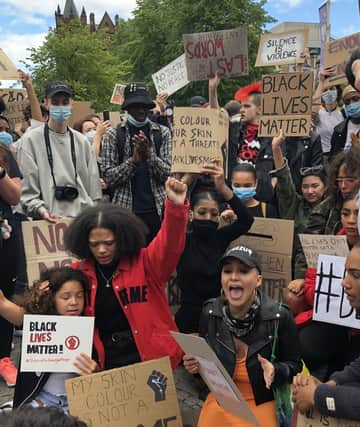Chief Constable Simon Byrne stands over policing of controversial Belfast Black Lives Matter rally


Public health concerns have been expressed after thousands gathered in Belfast city centre on Wednesday to express their outrage at the death of Mr Floyd in police custody in the US last week.
People were packed tightly together at the centre of the City Hall protest, with others observing social distancing at the fringes of the rally.
Advertisement
Hide AdAdvertisement
Hide AdThe Police Service of Northern Ireland (PSNI) maintained a low-key presence at the event, with officers observing from a distance.
Chief Inspector Gavin Kirkpatrick said officers had engaged with the organiser before and during the event and maintained a presence throughout.
PSNI Chief Constable Simon Byrne tweeted this morning that public protests at this time amid the pandemic “will endanger lives”.
When he later appeared before the Northern Ireland Policing Board, he stood over the police response.
Advertisement
Hide AdAdvertisement
Hide Ad“We have been asked questions about our approach yesterday but I think we also need to ask ourselves as a society in the community, what do people want from us and what was an acceptable outcome to yesterday because it’s easy to get emotive about a response to the restrictions on governments but remembering also that was largely a peaceful protest, there were no arrests made,” he said.
“And so what would be proportionate in terms of our response to then conduct a post event investigation or indeed seek to disperse that protest when ironically it was about an outcry in relation to police use of force and brutality.
“So we had to as ever, balance, a number of competing considerations when we supported the organisers yesterday who I don’t think expected as many people to turn up.
“We did have dialogue, we were able to facilitate something that we all cherish – that opportunity to cry out when something offends us – and we’re going to work with the organisers again in relation to the protest that is now planned for Saturday.”
Advertisement
Hide AdAdvertisement
Hide AdHe added: “Sometimes it’s getting that fine line right because what to one person is strong enforcement and being robust to other people is aggressive and oppressive, and it’s difficult to make these decisions real time.”
Assistant Chief Constable Alan Todd said the approach to policing the next planned protest on Saturday is being developed.
“We’ll start to develop a plan tomorrow for any events that may or may not take on Saturday,” he told the Policing Board.
“We note and share the public health concerns that arise out of those events.
Advertisement
Hide AdAdvertisement
Hide Ad“I would fully accept that through various lens policing often gets accused of an inconsistent approach and that is an inevitable consequence of what you ask us to do which is to police every set to circumstances on its own merits.”